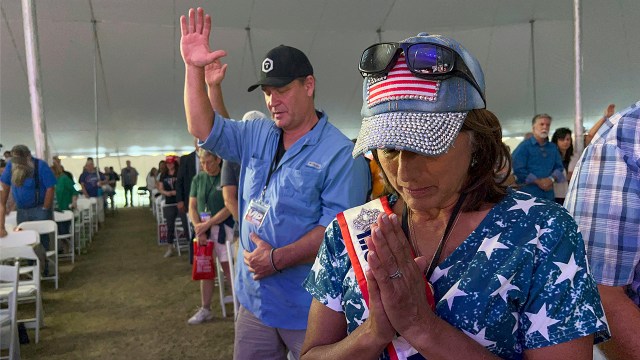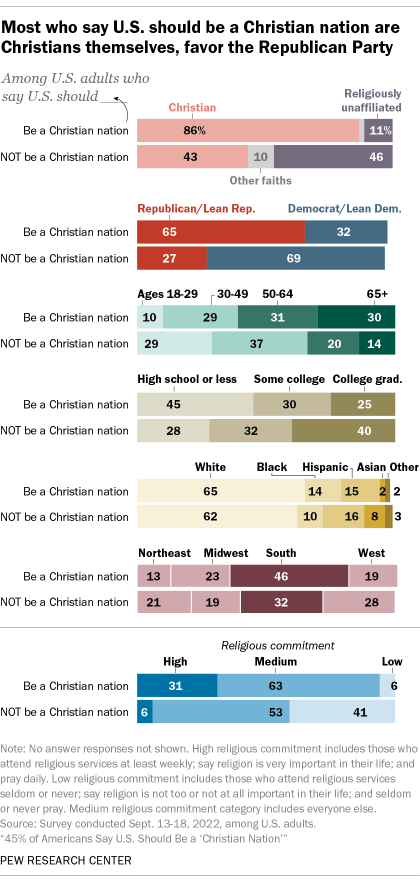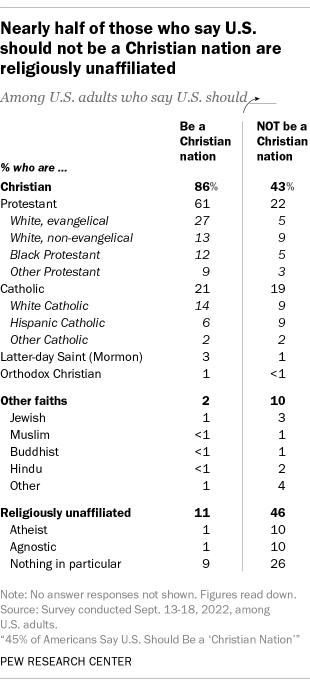
Americans have long debated the extent to which religion should influence public life. In a new Pew Research Center survey, more than four-in-ten U.S. adults (45%) believe the country should be a Christian nation, while roughly half (51%) say it should not be.
To further explore this divide, the Center analyzed the demographic and religious makeup of U.S. adults on both sides of the debate. Instead of looking at the percentage of Americans who hold a certain view about Christian nationhood – as the main survey report does – this complementary analysis takes the opposite approach. For instance, among adults who say the United States should be a Christian nation, what share are Christian, Hispanic or young people?
More than eight-in-ten people who say the U.S. should be a Christian nation (86%) are themselves Christian. This includes 27% who are White evangelical Protestants, 21% who are Catholic and 3% who are members of The Church of Jesus Christ of Latter-day Saints, also known as Mormons. Very few (1% or fewer) in this camp are Jewish, Muslim, Buddhist or Hindu, while 11% are religiously unaffiliated – describing themselves as atheist, agnostic or “nothing in particular.”
Related: What do people mean by ‘Christian nation?’
Pew Research Center conducted this study to explore Americans’ attitudes about religion’s role in public life. The analysis is based on a survey that asked respondents whether the U.S. should be a Christian nation, among other questions. Unlike the main survey report, this analysis flips the lens. So instead of looking at the share of adults who believe the U.S. should be a Christian nation, it looks at the demographic and religious composition of people who support or oppose Christian nationhood.
For this report, we surveyed 10,588 U.S. adults from Sept. 13 to 18, 2022. Roughly half of the survey’s respondents (5,311 participants) were randomly assigned to receive the questions about whether the U.S. should be a “Christian nation.” All respondents to the survey are part of Pew Research Center’s American Trends Panel (ATP), an online survey panel that is recruited through national random sampling of residential addresses. This way nearly all U.S. adults have a chance of selection. The survey is weighted to be representative of the U.S. adult population by gender, race, ethnicity, partisan affiliation, education, religious affiliation and other categories.
Here are the questions used for this analysis, along with responses, and its methodology.

Three-in-ten of those who say the U.S. should be a Christian nation (31%) are highly religious, based on a scale that measures how often people pray or attend religious services and how important they consider religion to be in their life. Only 6% have low religious commitment.
Among those who say the U.S. should be a Christian nation, 65% are Republicans or Republican-leaning independents, while 32% are Democrats or Democratic leaners. Most are older: Six-in-ten are in their 50s or older, including 30% who are at least 65, while just 10% of adults who say the U.S. should be a Christian nation are under 30. A plurality of Christian nationhood supporters (46%) live in the South, while smaller shares hail from the Northeast, Midwest and West.
Among those who believe the U.S. should not be a Christian nation, the picture is quite different. In an almost exact reversal, 69% of those who oppose Christian nationhood are Democrats or lean Democratic, while 27% are Republicans or GOP leaners. More than four-in-ten are Christian (43%), while 46% are religiously unaffiliated – including 10% who identify as atheist, 10% who are agnostic and 26% who describe their religious identity as “nothing in particular.” One-in-ten of those who say the U.S. should not be a Christian nation are members of religious faiths other than Christianity, including Jews (3%), Hindus (2%), Muslims (1%) and Buddhists (1%).

Roughly four-in-ten of those who say the U.S. should not be a Christian nation (41%) have low religious commitment – according to the scale that measures prayer, attendance and importance of religion – while just 6% are highly religious.
There also are some differences in the education levels of the two groups. A quarter of Americans who support the idea that the U.S. should be a Christian nation have a bachelor’s degree or more education, compared with 40% of those who oppose it.
When it comes to racial and ethnic composition, the two camps look more similar. For instance, White Americans make up roughly equal shares of the group that supports Christian nationhood (65%) and the group that opposes it (62%), as do Hispanic Americans (15% and 16%, respectively). Black Americans make up 14% of those who say the U.S. should be a Christian nation and 10% of those who say it should not.
Note: Here are the questions used for this analysis, along with responses, and its methodology.



